Expert:
Publications /
Policy Brief
The U.S.–China technological rivalry has become a central axis of global economic and geopolitical competition. While the United States continues to lead in frontier innovation—most notably in advanced semiconductors and artificial intelligence (AI)—China has consolidated strengths in large-scale implementation, manufacturing capacity, and control over critical segments of global supply chains. These advantages are especially visible in clean energy technologies and in the processing and refinement of critical minerals and rare earths.
The rivalry now unfolds across multiple frontlines, extending beyond innovation itself to encompass infrastructure, energy availability, and technology deployment across the New South. Its outcome will depend less on breakthrough inventions alone than on each country’s capacity to integrate technology, industrial policy, and energy systems into cohesive national strategies.
Introduction
This paper examines the evolving technological rivalry between the U.S. and China as a central axis of contemporary geopolitical and economic competition. While the U.S. retains leadership in frontier innovation—particularly in advanced semiconductors, AI models, and research ecosystems—China has steadily narrowed the gap through large-scale implementation, industrial coordination, and growing control over key global supply chains.
The rivalry now unfolds across multiple, interconnected frontlines, including semiconductors and AI, technology applications and industrial ecosystems, clean energy, critical minerals, and energy infrastructure. The analysis highlights a structural asymmetry: China’s comparative advantage lies in embedding “good-enough” technologies into physical production systems, supported by state coordination and scale, whereas the U.S. relies on innovation leadership, capital markets, and more selective forms of industrial policy.
Technological competition is also increasingly projected onto third regions, particularly the Global South, through infrastructure development, energy systems, and digital networks. The paper concludes that the U.S.–China rivalry is no longer defined solely by innovation leadership, but by the capacity to integrate technology into production, energy systems, and geopolitical influence—resulting in a fragmented yet deeply interdependent global technological order.
Climb the Ladder to the Top on your Own
China has thus far been one of the most successful cases of countries moving from lower to higher rungs of the income ladder during the era of globalization (Canuto, 2021). This ascent was made possible by combining access to technologies diffused through globalization with sustained “homework” in building local, idiosyncratic technological capabilities (Canuto, 1995). The result was a steady upgrading of domestic production and a progressive move up global value chains.
Against this backdrop, the restrictions imposed in 2019 by the first Trump administration on market access and technology for subsidiaries of the Chinese group Huawei, as well as ZTE, can be seen as more than isolated trade or security measures. As anticipated at the time, they represented the opening salvo of a confrontation destined to endure (Canuto, 2019).
In effect, the U.S. was sending a clear strategic message to China:
“You have made effective use of globalization to climb the technology and income ladder, combining technological access with investments in your own capabilities—but from this point onward, you will be expected to climb the remaining rungs on your own.”
Since then, China has undertaken a sustained investment effort aimed at reducing dependence on external technological frontiers across multiple domains. We have already addressed the cases of semiconductors and clean energy, including China’s upstream dominance in the refinement of critical minerals and rare earths (Canuto, 2023). U.S. export controls on advanced chips and manufacturing equipment have slowed China’s advance at the technological frontier, but they have not halted it. In some instances, these controls have even accelerated China's efforts to develop domestic alternatives.
The prospect of renewed Chinese access to advanced semiconductors, alongside continued U.S. access to critical minerals and rare earths refined in China, contributed to a temporary easing of tensions, allowing both countries to holster their trade weapons in October of last year (Canuto, 2025).
Technology as the Axis of Rivalry
Technology has emerged as the principal arena of strategic competition between the U.S. and China. It is no longer merely a driver of productivity and economic growth, but a "central control panel" shaping military capabilities, economic influence, data governance, and geopolitical power—even as global supply chains remain deeply interdependent (Goldman Sachs, 2025).
The technological race between the U.S. and China now serves as the organizing axis of their broader strategic rivalry. While the U.S. continues to lead in cutting-edge innovation, China is rapidly closing the gap, particularly in applied implementation, infrastructure deployment, and control over essential physical inputs, including refined critical minerals, rare earth elements, and energy systems.
What is the Current State of This War?
In an interview for Goldman Sachs (2025), Mark Kennedy identifies four key arenas shaping the U.S.-China technological race: “technological innovation, practical application of the technology, installation of the digital plumbing or infrastructure underpinning the technology, and technological self-sufficiency.”
While the U.S. remains the global leader in most frontier technologies—such as cutting-edge semiconductors, AI frameworks, cloud computing infrastructure, and quantum computing—China is rapidly closing the gap or assuming leadership in several other critical dimensions. U.S. companies continue to dominate chip design, key segments of semiconductor manufacturing equipment, and the development of the most advanced AI models. These strengths are reinforced by capital markets that attract global investment, as well as by a dense network of research universities capable of attracting top international talent—at least prior to the self-inflicted constraints on skilled labor inflows introduced since the start of the Trump 2.0 administration.
At the same time, the U.S. faces mounting domestic constraints. These include shortages of skilled labor for advanced manufacturing, high factory construction costs, fragmented power grids, and regulatory hurdles that slow the implementation of infrastructure projects.
China, by contrast, holds a strong advantage in the practical implementation of technology, leveraging scale and centralized coordination. This is evident in the adoption of industrial robotics at a scale twelve times that of the U.S. (Goldman Sachs, 2025), as well as in the deployment of AI in physical applications such as autonomous vehicles and drones, and in the rapid build-out of large-scale digital infrastructure.
Frontlines of the Technological Race (1): Semiconductors and AI
Four main battlefields can be identified in this rivalry. First and foremost are semiconductors and AI. It is important to recall that there is no single, linear semiconductor supply chain, but rather a complex network of interconnected value chains extending across the globe (Canuto, 2023). Within this network, key bottlenecks include advanced lithography systems, etching and deposition equipment, and access to cutting-edge manufacturing capacity.
The U.S. and its allies retain a modest overall advantage, particularly in chip design and manufacturing tools (Figure 1).
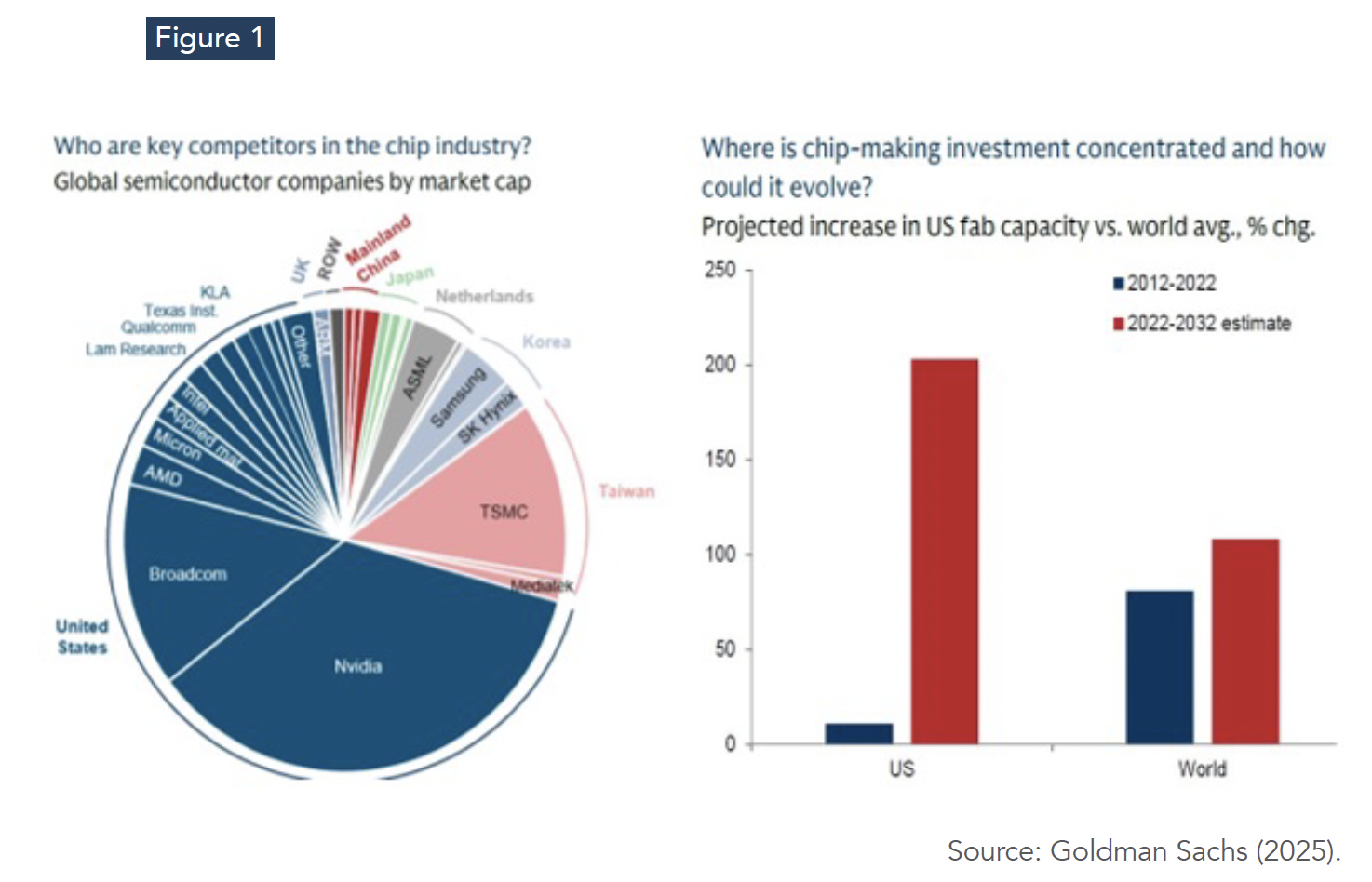
China faces significant technical challenges in replicating advanced lithography technologies (Garcia-Herrero et al., 2025). It is important to emphasize, however, that leadership in AI depends not only on access to the most advanced chips, but also on the dissemination and adoption of models. China's embrace of open-source and low-cost AI models has enabled rapid real-world implementation, even when relying on less advanced hardware and behind-the-frontier AI systems.
Figure 2 illustrates the rapid growth of Chinese patent filings in AI, semiconductors, and quantum computing, positioning China as the primary challenger to U.S. technological leadership. Yet, despite notable advances in specific subfields, China continues to face persistent gaps in several high-end segments¾particularly those most directly targeted by international export controls (Garcia-Herrero et al., 2025). In semiconductors, China's progress has remained concentrated in lower value-added stages of the supply chain, notably assembly and packaging (Canuto, 2023).
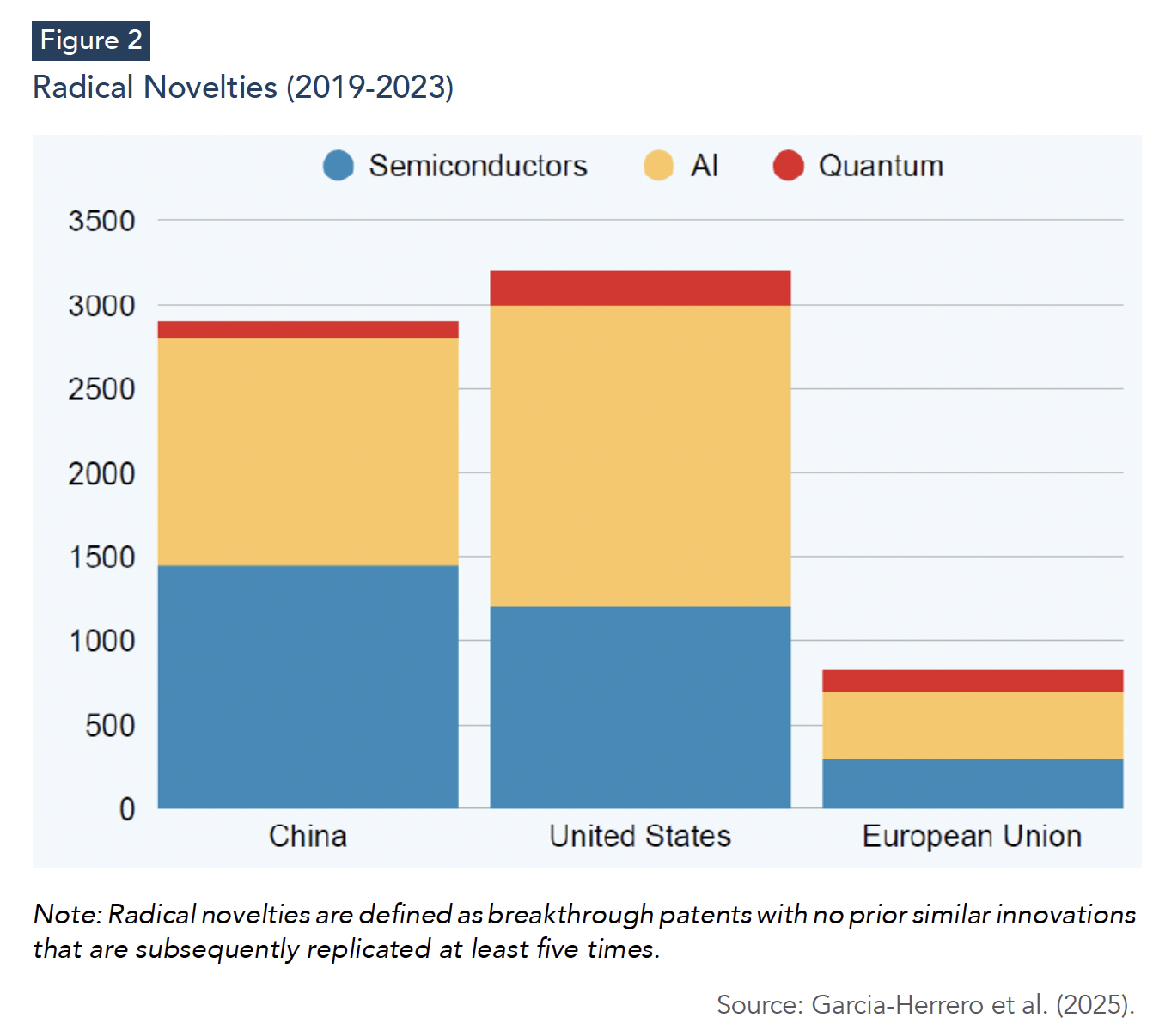
In the field of AI, the advantage long held by U.S. firms has been increasingly challenged by China’s low-cost “open” models, which are often free to use, modify, and integrate¾a strategy further supported by government subsidies. By contrast, leading U.S. technology groups¾such as OpenAI, Google and Anthropic¾have largely preserved tight control over their most advanced models, monetizing them through subscription-based services and enterprise contracts (Criddle, 2026).
Frontlines of the Technological Race (2): Applications
As noted by Angela Huyue Zhang (2026):
“While debates over the AI race between the United States and China tend to fixate on which country has the most powerful frontier models and the most advanced semiconductors, that framing is becoming outdated. As AI moves from our screens into the physical world, the question is no longer whose models hit technical benchmarks, but who can build and sustain an ecosystem that embeds AI into everyday products and services.”
As observed by Tej Parikh (2026):
“The technology race encompasses the embodiment of AI into physical environments through sensing, control and decision-making as generating text and images. This includes intelligent manufacturing, humanoid robots and applications in other devices, such as cars, phones and wearables.”
This perspective underscores the importance of ecosystems, including complementary technologies¾such as robotics and electric vehicles¾and, critically, the physical embodiment of AI. Consider, for example, the robotization of industry. China has emerged as a global leader in the integration of robots into the manufacturing processes (Figure 3).
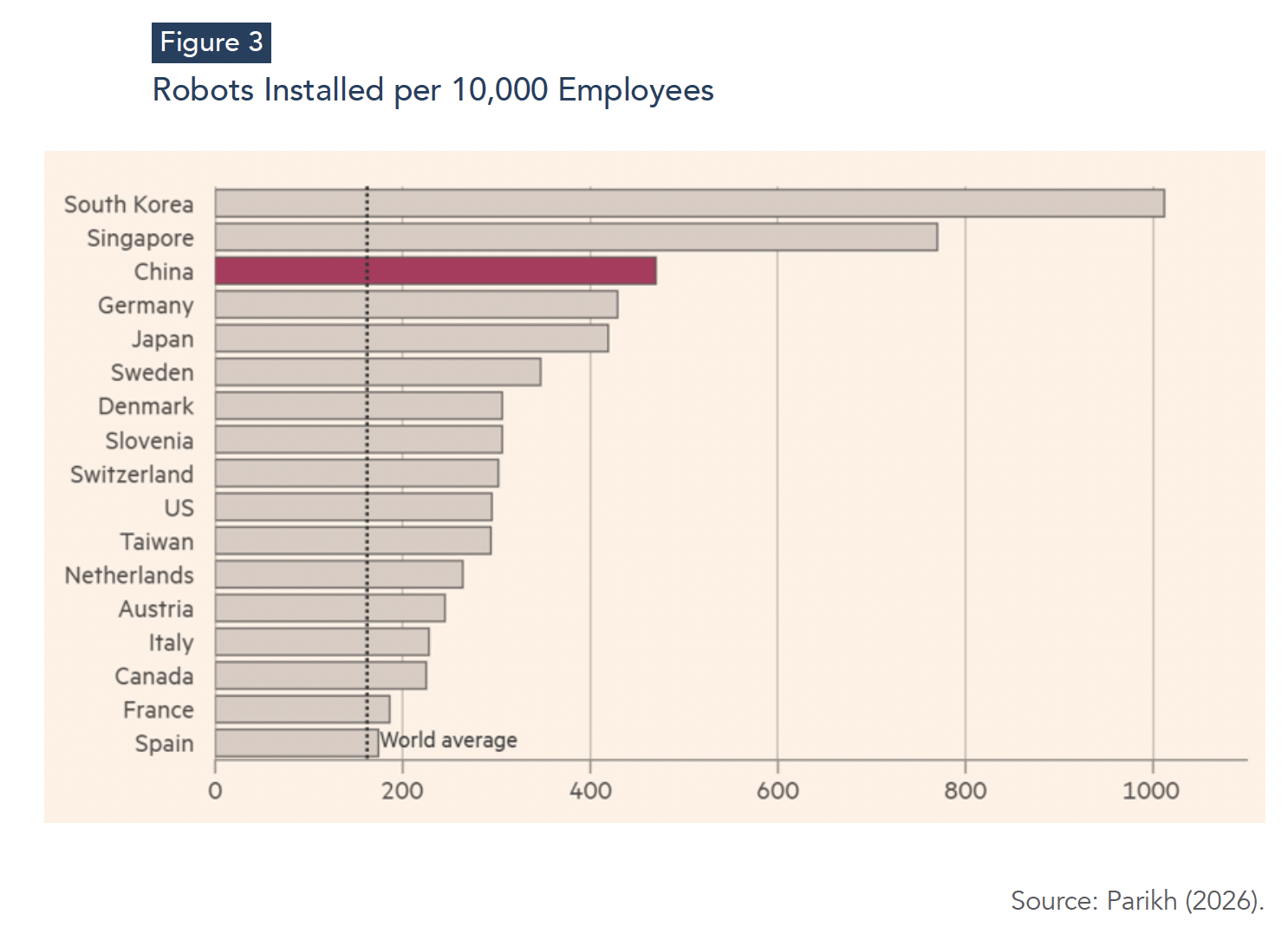
By the same token, one may point to batteries, electric vehicles, and self-driving cars¾what Noah Smith (2025) terms the “electric tech stack.” Electric vehicles, batteries, drones, robotics, smartphones, AI, and related technologies constitute a set of overlapping industries linked by mutually reinforcing feedback loops. This ecosystem logic is clearly illustrated by the network of Chinese firms mapped by Kyle Chan (2025) (Figure 4).
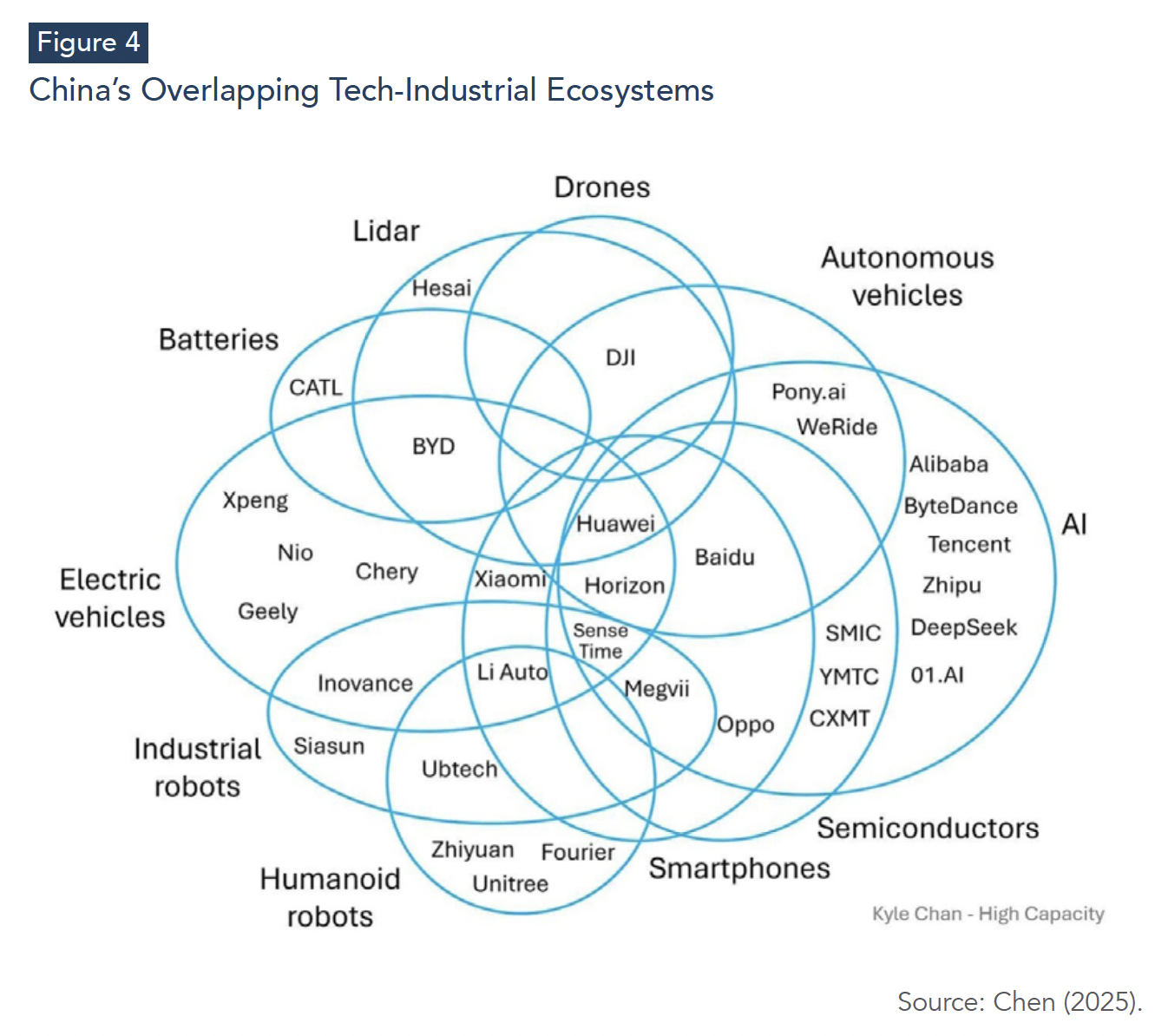
Frontlines of the Technological Race (3): Clean Energy
The landscape of clean-energy technologies stands in sharp contrast to that of semiconductors. In clean energy, China has established a dominant position across much of the value chain (Canuto, 2023).
The transition to clean energy requires both scientific innovation and the large-scale deployment of established technologies. The U.S. continues to excel in the former, including advanced research in carbon capture, storage, and removal. The U.S. is also exploring new frontiers in geothermal energy, benefiting from hydraulic fracturing expertise in the shale oil and gas industry.
By contrast, in commercial industries that are in the expansion phase, the U.S. lags China in the most critical decarbonization technologies¾solar, wind, batteries, and hydrogen. China’s faster pace of investment in clean energy over the past decade has translated into advantages in learning curves and technology diffusion.
Chinese dominance is particularly evident in solar energy (Figure 5). The 90% decline in the cost of solar power generation over the past decade has been driven largely by Chinese firms, which account for 75% to 95% of each segment of the value chain. Tariffs and import bans have not altered the fact that U.S. imports of photovoltaic cells today largely originate from Chinese manufacturers operating in Southeast Asia.
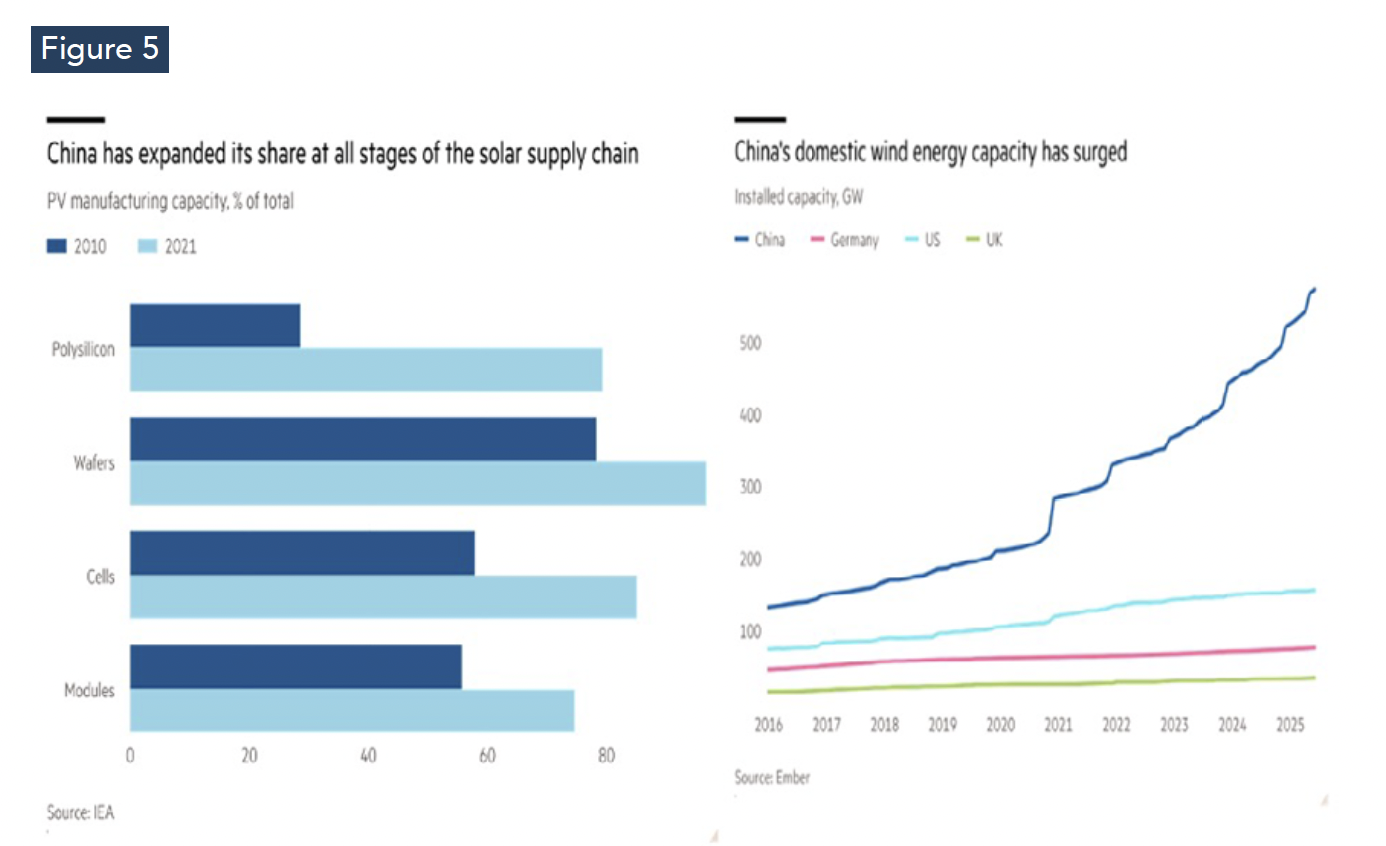
China is also at the forefront of electric vehicle battery production, gaining ground even against firms from Japan and South Korea that once led the technological forefront. Chinese producers benefited from the rapid expansion of domestic electric vehicle production, supported by government subsidies. The resulting productivity and competitiveness gains have enabled China to achieve a predominant position in global car exports (Canuto and Martins, 2024).
The case of wind energy is more complex. China now hosts the majority of the world’s ten largest wind turbine manufacturers, but these firms predominantly serve the domestic market (Figure 5, right side). Wind turbines¾given their large towers and blades¾require extensive on-site installation, servicing, and maintenance, posing challenges for Chinese firms operating abroad (Canuto, 2023).
U.S. President Biden secured congressional approval for the Inflation Reduction Act (IRA) and began its implementation to strengthen domestic clean-energy production, but President Trump subsequently unwound the policy. This reversal occurred at a moment when, due to technological learning, renewable energy costs had fallen sufficiently to compete directly with fossil fuels.
Frontlines of the Technological Race (3): Critical Minerals and Rare Earths
Another focal point of competition lies in rare earths and critical mineral supply chains. China dominates mining, refining, and magnet production, particularly for heavy rare earths used in defense and advanced technologies (Figure 6).
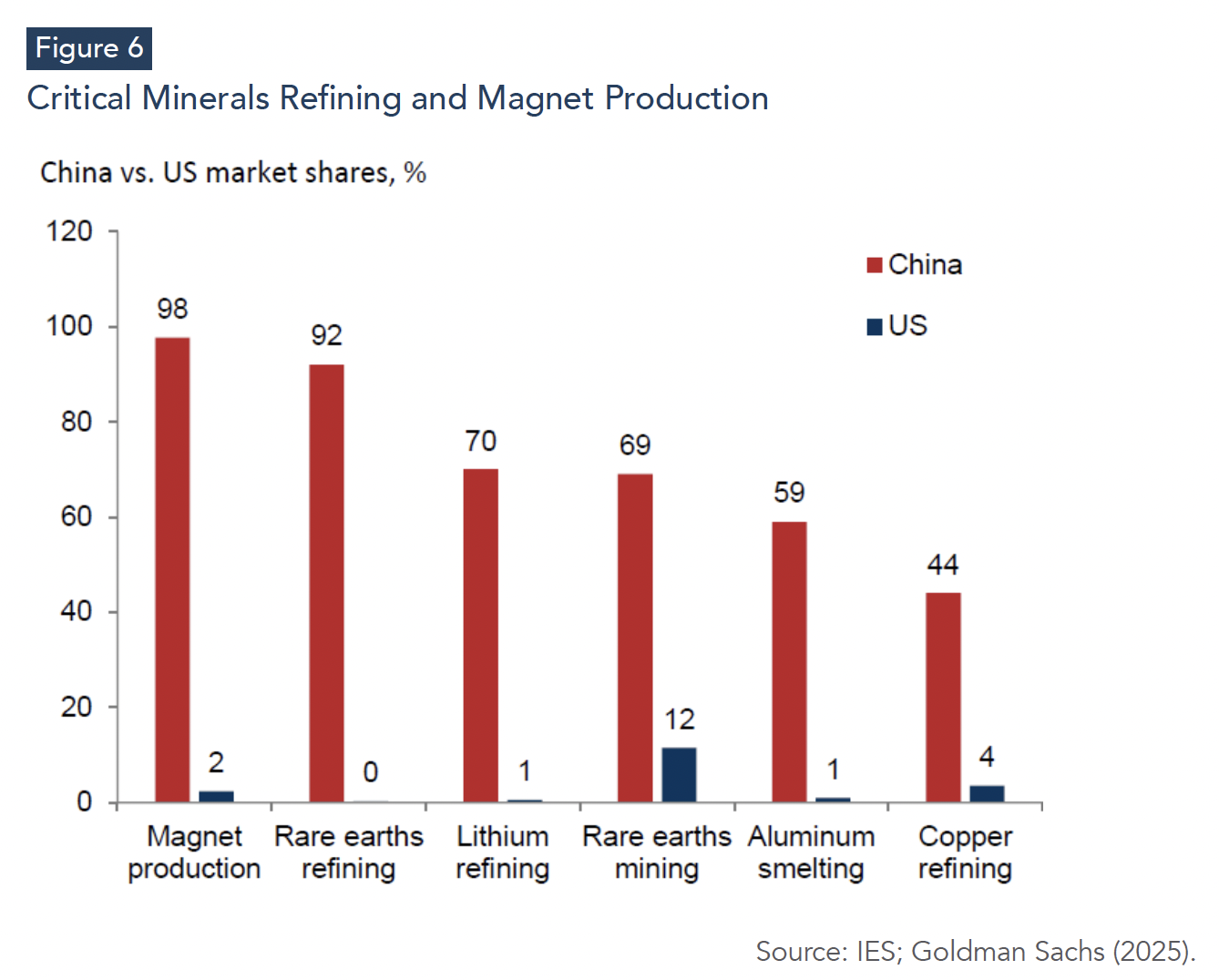
This dominance provides China with significant leverage, even though total U.S. demand for rare earths is relatively small in absolute terms. U.S. vulnerability to Chinese supply was a key factor behind Washington’s willingness to compromise on restrictions to Chinese access to advanced semiconductors, contributing to last year’s trade truce (Canuto, 2025).
China’s territory is rich in mineral resources critical to clean technologies, including 72% of the global natural graphite reserves and 66% of rare earth elements (Garcia-Herrero et al., 2023). Nevertheless, the extraction of clean-tech minerals is geographically dispersed, reflecting the global distribution of deposits (Figure 7).
Chinese companies have actively acquired assets abroad, securing substantial shares of cobalt and lithium supplies. While mineral deposits are globally distributed, refining capacity is heavily concentrated in China. Recent Chinese threats by China to restrict exports of gallium and germanium marked an escalation in competition over critical minerals, turning supply chains into yet another arena for proxy wars.
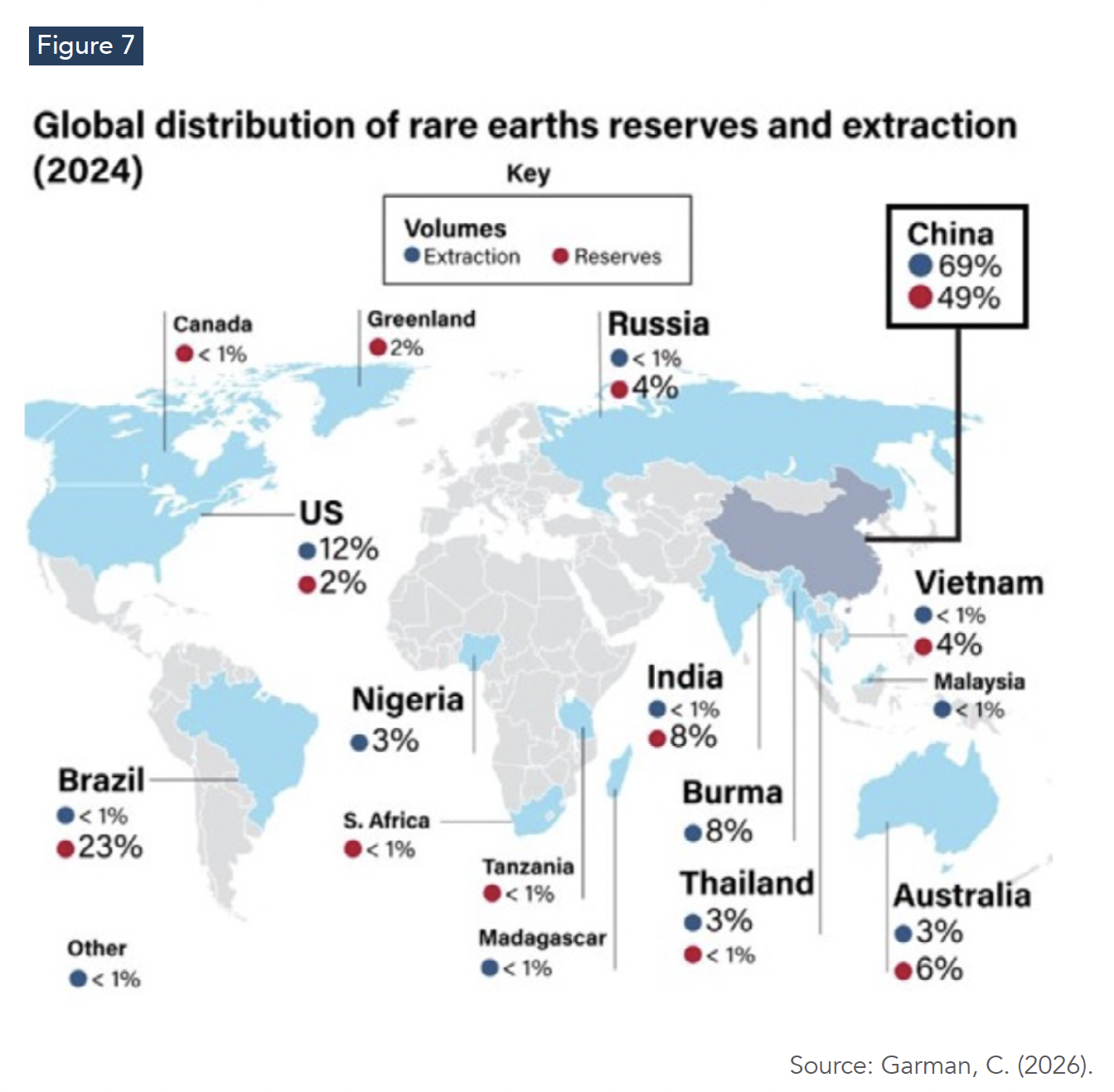
Beyond domestic extraction, China has constructed an extensive international network of mineral supply agreements, including acquisitions and trade deals, particularly in southern and western Africa, Oceania, Latin America, and neighboring regions. As illustrated in Figure 6 above, globally, China commands over 85% of rare earth processing and holds dominant positions in silicon and cobalt refining¾inputs essential to high-energy-density batteries, wind turbines, and solar panels.
Enhancing U.S. resilience will require supply diversification, targeted government support, and cooperation with allies. Even so, rare earths are likely to remain a persistent vulnerability and a recurring source of geopolitical tension in the years ahead.
Frontlines of the Technological Race (4): Energy Availability and Infrastructure
Beyond the three previous battlegrounds, energy availability and infrastructure emerge as decisive factors. Advanced AI systems and data centers are extraordinarily energy-intensive, and electricity demand from proliferating data centers is projected to rise sharply. Citing McKinsey projections, O’Neill (2026) notes that: “The new data centers coming online between now and 2030 will need more than 600 terawatt hours of electricity, enough to power nearly 60 million homes.”
Power demand from AI data centers is expected to quadruple over the next decade (Figure 8), without a commensurate expansion in power generation capacity (Figure 9).
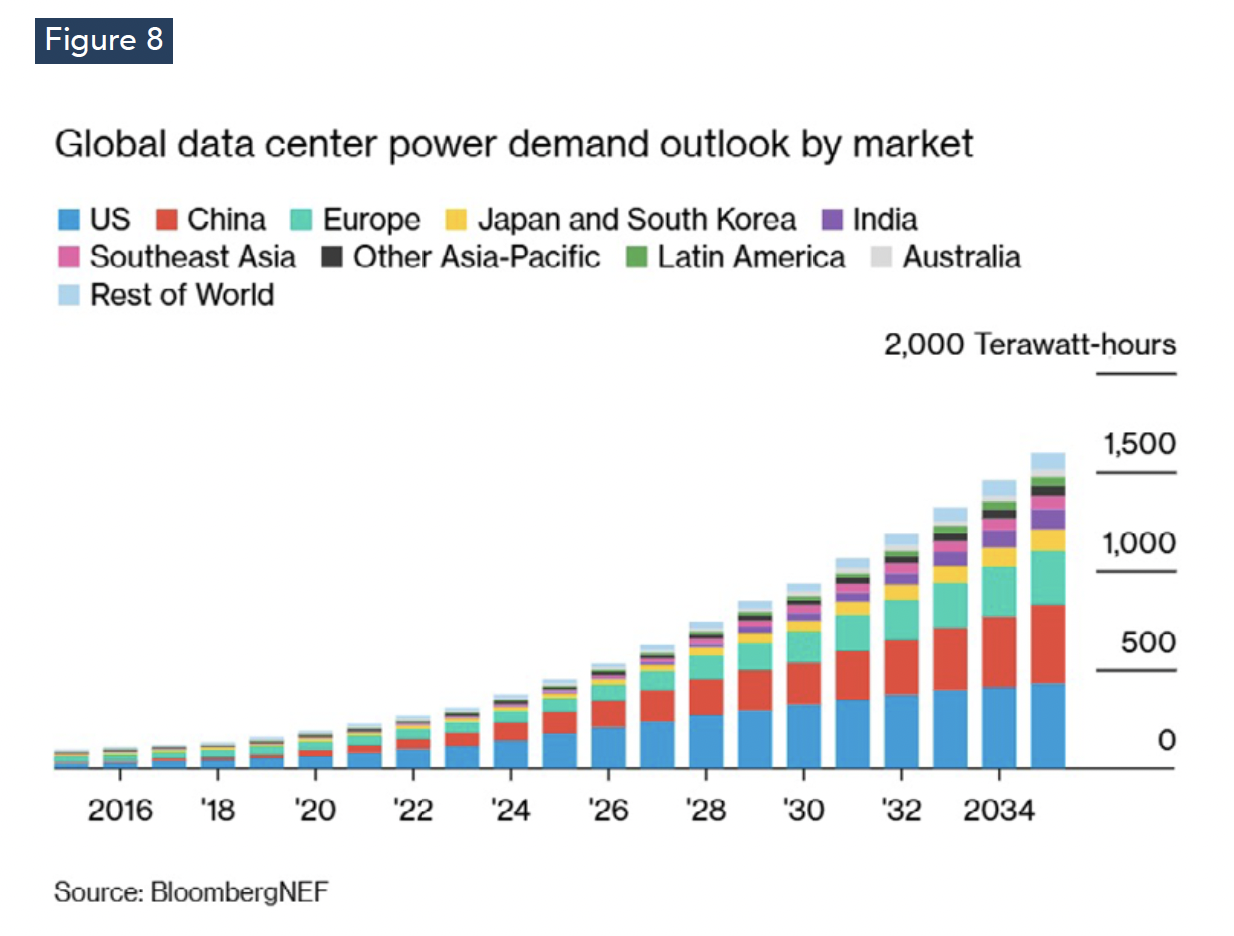
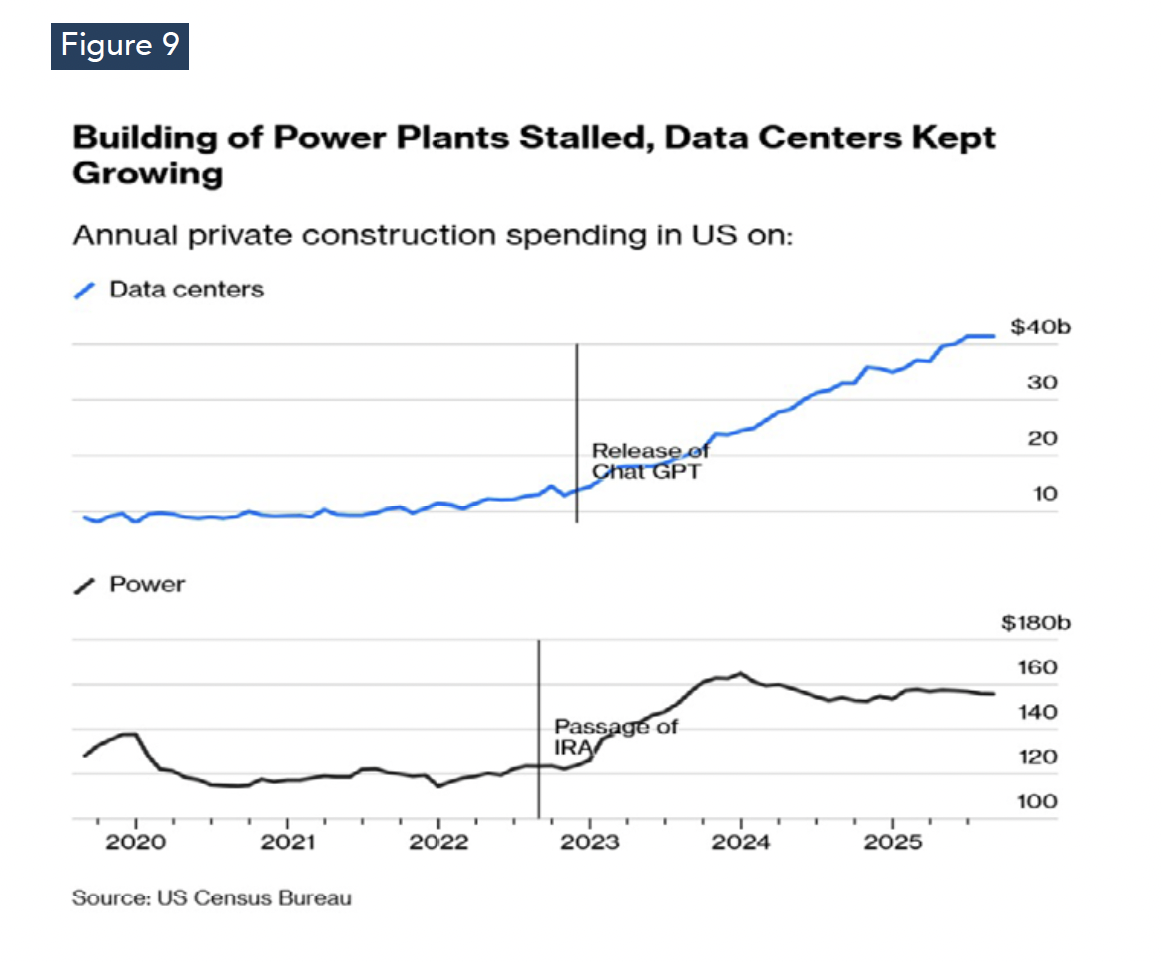
China's abundant and coordinated investment in electricity generation—particularly in renewable and nuclear power—gives it an advantage. By contrast, U.S. energy constraints and the fragmentation of its power grid may increasingly limit AI expansion (Figure 10).
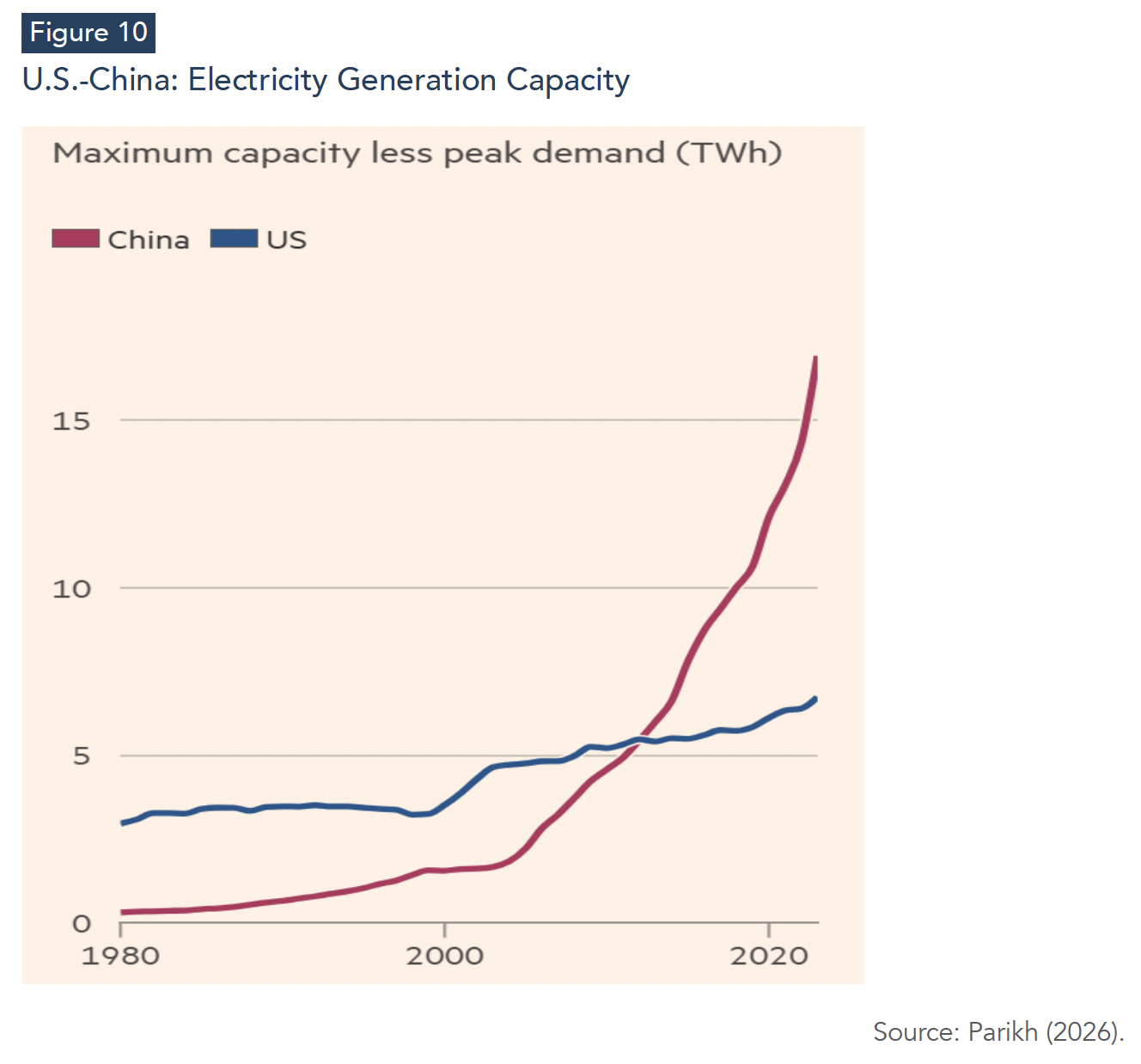
The “New Normal” of Firm-Specific Policies
Government support through industrial policies represents another area of divergence between the U.S. and China, even as the U.S. has intensified sector- and firm-specific interventions in recent years.
The U.S. approach may be characterized as “hybrid and fragmented,” combining elements of wartime mobilization and Cold War competition with market-based incentives (Goldman Sachs, 2025). Policies such as President Biden’s CHIPS Act, advanced manufacturing tax credits, government loans or equity stakes, and investment commitments from trade partners aim to encourage domestic production in strategic sectors. At the same time, innovation remains largely private-sector driven, with government policy focused more on de-risking than on direct coordination.
The Trump administration rolled back Biden’s IRA amid a global shift toward decarbonization. It also suspended new offshore wind leases and blocked several projects, despite the fact that offshore wind requires localized manufacturing and maintenance near installation sites. Conversely, the U.S. government has taken equity stakes in rare earth companies, reflecting the strategic importance of critical minerals not only for clean energy but also for military and civilian industrial applications.
China’s model, by contrast, is “holistic and highly coordinated.” Long-term planning through Five-Year Plans, government-guided investment funds, subsidized land and energy, talent development, and directed procurement work in concert to accelerate progress in priority sectors. This system enables rapid resource mobilization and scaling after technological breakthroughs, though it also risks overcapacity and inefficiencies.
The New South as a Terrain of Technological Contestation
The U.S.-China technological rivalry increasingly spills over into other regions, including the energy-rich countries of the "New South." China has advanced an initiative to "digitize countries of the South," offering bundled infrastructure, services, and data-access contracts that could position it to control networks and data flows across large parts of the world while adapting AI models to local markets.
The Gulf and the Middle East¾both energy-rich regions¾have become pivotal in the AI era. Washington and Beijing are competing for partnerships in data centers and energy supply, with the U.S. seeking security guarantees to prevent sensitive technologies from being transferred to China.
Jorge Arbache (2025) has introduced the concept of "powershoring," whereby countries such as Brazil pursue industrial relocation strategies based on access to green, secure, and low-cost. The objective is to attract energy-intensive industries, reduce emissions, and strengthen integration into sustainable global supply chains. Ideally, such opportunities will not be subsumed solely into the U.S.-China rivalry over AI data center deployment.
Final remark
In conclusion, the rivalry reveals two divergent but competing paths. The U.S. relies on high investment, frontier semiconductors, and proprietary ecosystems, while China focuses on embedding “good-enough” models into physical applications and disseminating them globally. The U.S.–China competition is no longer defined solely by innovation leadership, but by the ability to integrate technology into production systems, energy infrastructure, and geopolitical influence—resulting in a fragmented yet deeply interdependent global technological order.
References
Arbache, J. (2025). Powershoring: a Game-Changer for Climate Action and Sustainable Industry, Green Initiative, February 4.
Canuto, O. (1995). “Competition and Endogenous Technological Change: an Evolutionary Model”, Revista Brasileira de Economia, v. 49 n. 1, p. (1995)
Canuto, O. (2019). The US-China Trade War Is Accelerating China’s Rebalancing. Policy Center for the New South, November 8.
Canuto, O. (2021). Climbing a High Ladder: Development in the Global Economy. Policy Center for the New South.
Canuto, O. (2023). A Tale of Two Technology Wars: Semiconductors and Clean Energy, Policy Center for the New South PB - 41/23, November 2.
Canuto, O. and Martins, A.J. (2024). The Automotive Transition on the Road to Decarbonization, Policy Center for the New South PB - 51/24, October 9.
Canuto, O. (2025). The United States and China holstered their weapons, Center for Macroeconomics and Development, November 1.
Chen, K. (2025). China's Overlapping Tech-Industrial Ecosystems, High Capacity, January 22.
Criddle, C. (2026). Microsoft Warns that China is Winning AI Race Outside the West, Financial Times, January 13.
García-Herrero, A.; Grabbe, H.; and Källenius, A. (2023). De-risking and Decarbonising: a Green Tech Partnership to Reduce Reliance on China, Bruegel, October 26.
García-Herrero, A., M. Krystyanczuk and R. Schindowski. (2025). Radical Movelties in Critical Technologies and Spillovers: How do China, the US and the EU Fare?. Working Paper 07/2025, Bruegel.
Garman, C. (2026). Brazil has Increasingly Valuable Assets in a World of Great Power Conflict, Eurasia Group, January 26.
Goldman Sachs (2025). Top of Mind: The US-China Tech Race, issue 144, December 4.
O’Neill, S. (2026). The AI Bubble Is Getting Closer to Popping, Bloomberg, January 28.
Parikh, T. (2026). China Will Clinch the AI Race, Financial Times, January 18.
Smith, N. (2025). Why every country needs to master the Electric Tech Stack, Noahopinion, September 23.
Zhang, A. H. (2026). Overcapacity is China’s Biggest AI Advantage, Project Syndicate, January 7.


